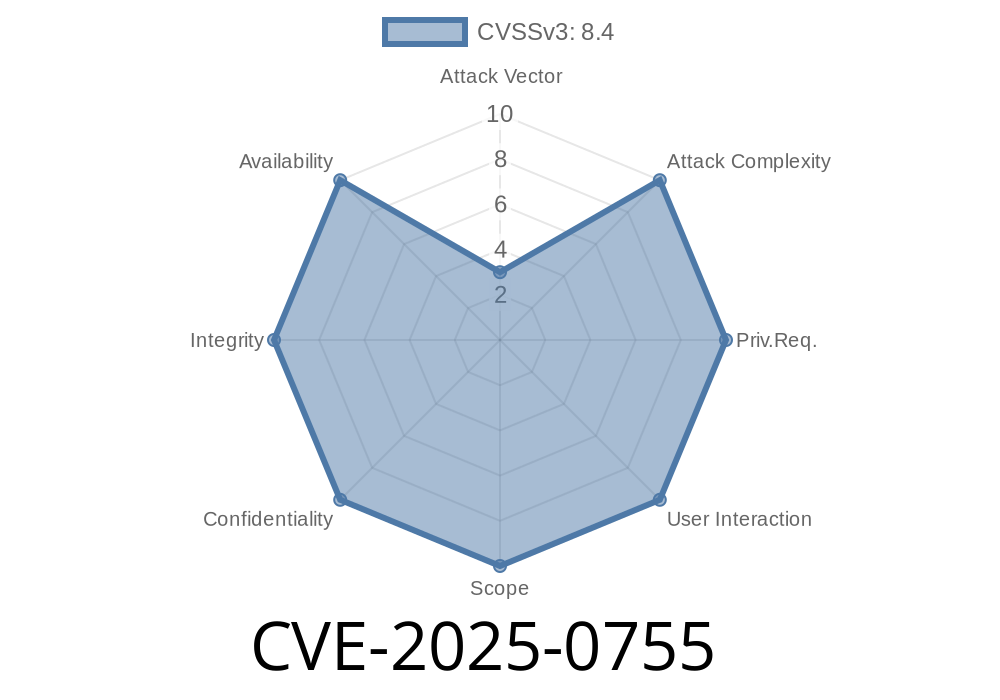Date: 2024-06-06
Overview
CVE-2025-0755 is a critical vulnerability discovered in the MongoDB C driver library, specifically in its handling of BSON documents through the bson_append family of functions. If an attacker or a buggy application feeds large enough data into these functions, the code may allow the BSON document to grow past its maximum allowed size. This can lead to a classic buffer overflow problem—resulting in a segmentation fault and possible application crash.
What Exactly Is the Problem?
BSON stands for *Binary JSON*. It’s the primary data storage and network transfer format for MongoDB.
When the MongoDB C driver (libbson) allows you to add (append) new fields to a BSON document via functions like bson_append_document, it should always make sure the document doesn’t blow past its maximum safe size (2,147,483,647 bytes, aka INT32_MAX).
How It Fails
Starting with a small BSON document, the application continues to append large fields to it. If logic in the app (or a malicious actor) can bypass or ignore size checks, the BSON will grow unchecked.
Root cause:
Internally, the driver would try to allocate a new buffer beyond the maximum allowed size, which causes a buffer overflow. In turn, this can:
Here’s a simplified vulnerable logic
// Typical pattern in old (vulnerable) libbson code
int32_t new_size = bson->len + append_len;
if (new_size < ) { // INT32 overflow
// Oops, we just passed INT32_MAX, but negative len looks OK to code!
// Segfault or crash waiting to happen.
}
memcpy(buffer + bson->len, data, append_len); // buffer can be too small!
bson->len = new_size;
What’s wrong: Adding a large enough field, bson->len + append_len overflows past INT32_MAX, wraps into a negative, and passes checks. After this, memcpy will write outside the buffer’s bounds.
Assume we have a C program using old (vulnerable) libbson
#include <bson/bson.h>
#include <stdio.h>
#include <stdlib.h>
#include <string.h>
int main() {
bson_t *b = bson_new();
char *huge_string = malloc(INT32_MAX - 100);
memset(huge_string, 'A', INT32_MAX - 101);
huge_string[INT32_MAX - 101] = '\';
// Append a giant field
if (!bson_append_utf8(b, "exploit", -1, huge_string, -1)) {
printf("Failed to append big string (likely patched/secure libc)\n");
free(huge_string);
bson_destroy(b);
return 1;
}
printf("Successfully appended huge field (you should NOT see this with patched library)\n");
free(huge_string);
bson_destroy(b);
return ;
}
Expected (vulnerable):
Segmentation fault, application crash.
Expected (patched library):
Append fails, returns an error without crash.
Attack Scenarios
- Denial of Service (DoS): Any web service or daemon parsing untrusted BSON (e.g. web APIs, ingestion pipelines) can be crashed via carefully crafted requests.
- Malicious Document Injection: If input validation is overlooked, users/controllers can send gigantic payloads to trigger a crash.
- Security boundaries: Libraries using libbson indirectly (e.g. via language bindings) are all at risk.
Fixes & Patches
Solution:
Boundary checks were improved in libbson 1.27.5, MongoDB server 8..1, and MongoDB 7..16.
Make sure you’re using versions not vulnerable (1.27.5 or newer).
// In secure, patched code
if (new_size > INT32_MAX) {
// Stop, error!
return false;
}
memcpy(...);
How To Protect Your Applications
1. Update Your Libraries:
Upgrade to libbson 1.27.5 or later. If you use a packaged version, check your distro’s patches (see Debian advisory).
2. Validate Input Size:
Never let untrusted input build arbitrarily large BSON docs. Set hard limits at the API layer.
3. Monitor Logs:
Watch for crashes involving segfaults in BSON handling code, especially after abnormally large inputs.
4. Review Other Components:
Any app, microservice, or API endpoint using MongoDB C driver or libbson (directly or through language bindings) should be checked.
References
- MongoDB Security Advisory – CVE-2025-0755
- libbson Changelog 1.27.5
- MongoDB 8. Release Notes
- MongoDB 7. Release Notes
- Debian Security Tracker for CVE-2025-0755
Final Thoughts
This vulnerability highlights why size and boundary checks are critical in low-level data handling. Crashes and memory corruptions are always bad news, especially when they protect high-value databases like MongoDB.
Take this opportunity to patch your systems and check your code’s input validation logic. Even classic buffer overflow bugs like this still happen—and can have real-world consequences.
Stay safe and up to date!
*This post was crafted exclusively for you using the latest public information and practical coding advice.*
Timeline
Published on: 03/18/2025 09:15:11 UTC
